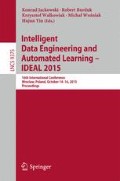Abstract
Both Non-negative matrix factorization (NMF) and Principal component analysis (PCA) are data reduction methods. Both of them act as approximation methods permitting to represent data by lower rank matrices. The two methods differ by their criteria how to obtain the approximation. We show that the main assumption of PCA demanding orthogonal principal components leads to a higher rank approximation as that established by NMF working without that assumption. This can be seen when analyzing a data matrix obtained from vibration signals emitted by a healthy and a faulty gearbox. To our knowledge this fact has not been clearly stated so far and no real example supporting our observation has been shown explicitly.
Access this chapter
Tax calculation will be finalised at checkout
Purchases are for personal use only
References
Bartkowiak, A.M., Zimroz, R.: Probabilistic principal components, how this works. In: Saeed, K., Homenda, E. (eds.) CISIM 2015, IFIP LNCS 9339 (in print) (2015)
Berry, M.W., et al.: Algorithms and applications for approximate nonnegative matrix factorization. Comput. Stat. Data Anal. 52, 155–173 (2007)
Cichocki, A., Zdunek, R., Phan, A.H., Amari, Sh: Nonnegative Matrix and Tensor Factorizations. Applications to Exploratory Multi-way Data Analysis and Blind Source Separation. Wiley, Chichester (2009)
Fevotte, C., Bertin, N., Durrieu, J.-L.: Nonnegative matrix factorization with the Itakura-Saito divergence. With application to music analysis. Neural Comput. 21(3), 793–830 (2009)
Gillis, N.: The why and how of nonnegative matrix factorization. In: Suykens, J.A.K., et al. (eds.) Regularization, Optimization, Kernels and Support Machines, pp. 3–39. Chapman & Hall/CRC, London (2014)
Guillamet, D., Vitria, J., Schiele, B.: Introducing a weighted non-negative matrix factorization for image classification. Pattern Recogn. Lett. 24, 2447–2454 (2003)
Hoyer, P.O.: Non-negative matrix factorization with sparseness constraints. J. Mach. Learn. Res. 5, 1457–1469 (2004)
Jolliffe, I.T.: Principal Component Analysis, 2nd edn. Springer, New York (2002)
Lee, D.D., Seung, H.S.: Learning the parts of objects by nonnegative matrix factorization. Nature 401, 788–791 (1999)
Li, B., et al.: A new feature extraction and selection scheme for hybrid fault diagnosis of gearbox. Expert Syst. Appl. 38, 1000–1009 (2011)
Li, X., Fukui, K.: Fisher non-negative matrix factorization with pairwise weighting. In: IAPR Conference on Machine Vision Application, MVA 2007, pp. 380–383. Tokyo, Japan, May 16–18 (2007)
Li, S.Z., et al.: Learning spatially localized, parts-based representation. In: Proceesings of IEEE International Conference on Computer Vision and Pattern Recognition, vol. 1, pp. 207–2012. Havaii, December 2001
Tsagaris, V., Anastassopoulos, V.: Feature extraction of Meris data. In: Proceedings of the 2004 Envisat & ERS Symposium, Salzburg, Austria, 6–10 September 2004 (ESA SP-572, April 2005), pp. 1–5 (2005)
Zimroz, R., Bartkowiak, A.: Two simple multivariate procedures for monitoring planetary gearboxes in non-stationary operating conditions. Mech. Syst. Signal Process. 38, 237–247 (2013)
Zimroz, R., Bartkowiak, A.: Investigation on spectral structure of gearbox vibration signals by principal component analysis for condition monitoring purposes. J. Phys. Conf. Ser. 305(1), 012075 (2011)
Zdunek, R.: Trust-region algorithm for nonnegative matrix factorization with alpha- and beta-divergences. In: Pinz, A., Pock, T., Bischof, H., Leberl, F. (eds.) DAGM and OAGM 2012. LNCS, vol. 7476, pp. 226–235. Springer, Heidelberg (2012)
Zurada, J.M., Ensari, T., Asi, E.H., Chorowski, J.: Nonnegative matrix factorization and its application to pattern recognition and text mining. In: Proceedings of the 13th FedCSIS Conference on Computer Science and Information Systems, Cracow, pp. 11–16 (2013)
Author information
Authors and Affiliations
Corresponding author
Editor information
Editors and Affiliations
Rights and permissions
Copyright information
© 2015 Springer International Publishing Switzerland
About this paper
Cite this paper
Bartkowiak, A.M., Zimroz, R. (2015). NMF and PCA as Applied to Gearbox Fault Data. In: Jackowski, K., Burduk, R., Walkowiak, K., Wozniak, M., Yin, H. (eds) Intelligent Data Engineering and Automated Learning – IDEAL 2015. IDEAL 2015. Lecture Notes in Computer Science(), vol 9375. Springer, Cham. https://doi.org/10.1007/978-3-319-24834-9_24
Download citation
DOI: https://doi.org/10.1007/978-3-319-24834-9_24
Published:
Publisher Name: Springer, Cham
Print ISBN: 978-3-319-24833-2
Online ISBN: 978-3-319-24834-9
eBook Packages: Computer ScienceComputer Science (R0)

